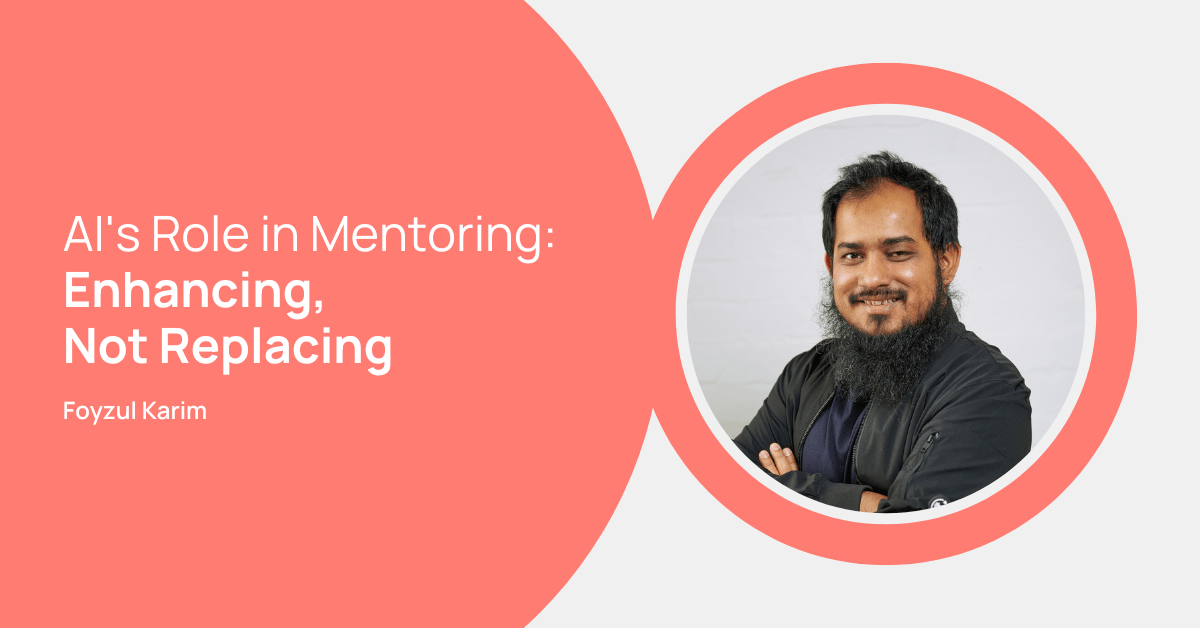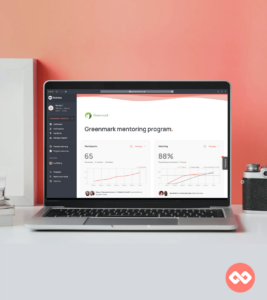Mentorloop Senior Software Engineer, Foyzul Karim, shares his thoughts on AI and its role in mentoring relationships through his unique perspective of working in tech, being a mentor, and working on a mentoring app in his role at Mentorloop.
As a mentor with a 10+ year track record and an audience of over 25,000+ followers on LinkedIn and 20,000+ subscribers on YouTube, I’ve seen firsthand how impactful structured guidance can be. Many of my mentees, especially from Bangladesh, have transformed their careers by finding the right direction, not just through gaining new skills but through understanding what skills are worth mastering. And in today’s world where information is abundant, the challenge lies in choosing what to learn and being pointed in the right direction. This is where mentoring makes all the difference.
Is AI Really Threatening Human Roles?
With the rise of AI—especially breakthroughs like large language models (LLMs)—a global shift is underway. We are witnessing a transformation as dramatic as the introduction of personal computers in the 1960s. Much like then, people are concerned that AI will replace human roles. As a mentor, I’ve made it a point to reassure my mentees that right now, AI is not here to replace humans but to empower us.
AI excels at automating repetitive tasks, allowing humans to focus on more strategic and creative things. And this isn’t new. Technology evolves to remove tedious tasks from people’s workflows, leaving room for higher-level thinking. So in light of this, my advice to mentees is simple:
- Learn to use AI effectively: Just as today’s workforce must know how to use computers and word processors, tomorrow’s workers will need to be AI-literate. It’s not enough to know how AI works; understanding how to prompt AI for better results is key.
- Invest in AI knowledge: Encourage organizations and individuals to be proactive about AI adoption. Industries need to become AI-ready, and individuals should look to invest time in learning these tools, shaping their careers in AI-driven landscapes.
And with this shift in mindset, I see growing engagement from mentees asking about AI tools, LLMs, and ways to incorporate AI into their work. This is a positive step toward a future where humans and AI collaborate.
Mentorloop: Using AI to Enhance Human Connections
At Mentorloop, we believe that human connection is the foundation of a successful mentoring relationship. While AI is incredibly powerful, we don’t believe in superficially throwing AI-generated insights at mentees. Instead, we focus on using AI to enhance the mentoring process—making it more efficient, insightful, and, ultimately, more human.
For instance, we leverage AI to help mentors by generating meeting agendas based on previous notes, goals, and progress. This allows mentors to focus on sharing wisdom, while AI takes care of routine tasks, making the mentoring experience more seamless. Mentees benefit from AI-driven recommendations that structure and streamline their journey, allowing them to focus on learning and growth.
The way we want to use AI here at Mentorloop is simple: use AI to amplify human potential, not replace it. We want mentors to spend less time on logistics and more time imparting wisdom, and we want mentees to achieve more, painlessly and effectively. And this isn’t new for us. We have always believed that technology should serve to enable human connections. It’s why Mentorloop was created to begin with—to enable people heroes to make mentoring more accessible to more people by removing admin burden through technology.
Mentoring vs Training and AI’s Role in Both
I often remind my audience that there’s a fundamental difference between mentoring and training. As the world around us evolves, upskilling through new knowledge and tools will remain essential. People will continue to learn through modern platforms—whether via online courses, podcasts, or virtual events. But mentoring is different.
A mentor’s role is akin to that of a doctor, diagnosing a mentee’s specific challenges and prescribing the right tools or techniques to address them. In practice, mentoring isn’t something that can be used in lieu of training—instead, it can be used to inform how you approach training. Mentors are the best placed to direct mentees into the right courses or training based on the goals they discuss in mentoring meetings.
And this is why a mentor’s wisdom, experience, and insight cannot be replaced by AI. This is where human connection, nurtured by AI, becomes invaluable. Training programs are everywhere and AI will never have the ability to know an individual enough to point them in the right direction in the way a human mentor could. However, what AI can do is do things like quickly give you a list of websites that offer the courses your mentor has suggested, or give you a short list of blogs that explore topics of interest.
Conclusion: AI and Human Potential in Mentoring
I believe that right now, AI is here to elevate us, not replace us. By embracing AI as a tool for growth, we can enhance human potential in mentoring and beyond. At the end of the day, it’s the human touch that will always remain irreplaceable, and with the right support from AI, we can make that touch even more impactful.
As we navigate the rise of AI, the role of mentors becomes more crucial, not less. AI can help us deliver more effective, personalized mentoring experiences, but it will never replace the wisdom, experience, and human insight that makes mentoring transformative. The future of mentoring will never include AI replacing humans—it will be about encouraging mentors and mentees to confidently and comfortably use AI tools available to us to elevate their mentoring journey and achieve their goals together. At Mentorloop, our goal is to make these connections more meaningful and enjoyable for both mentors and mentees, not replace the human element. And we believe that with this approach, Mentorloop will be at the forefront of that transformation.




